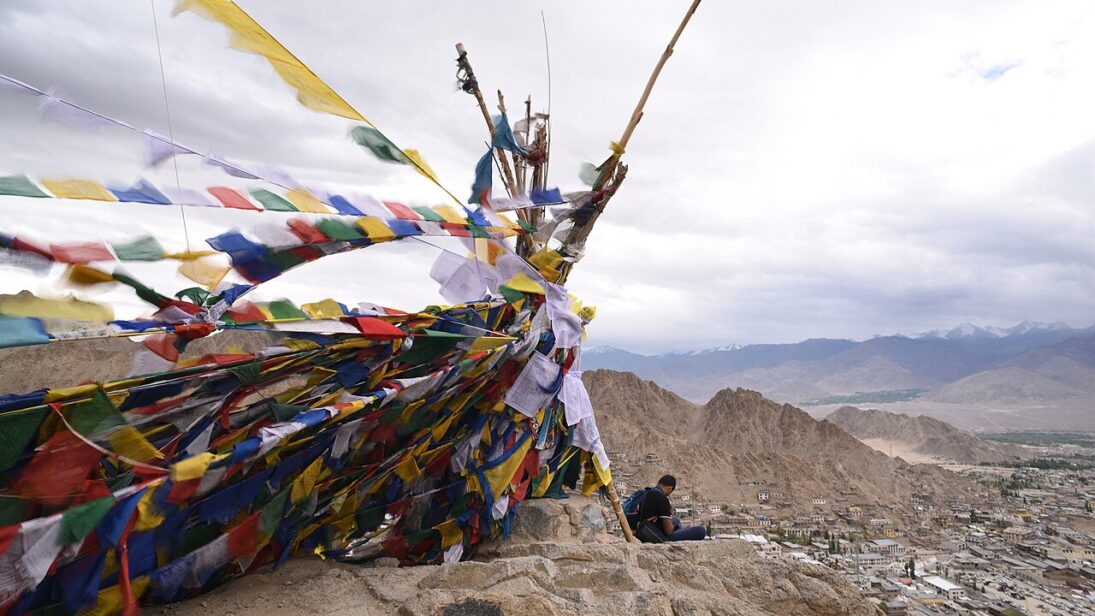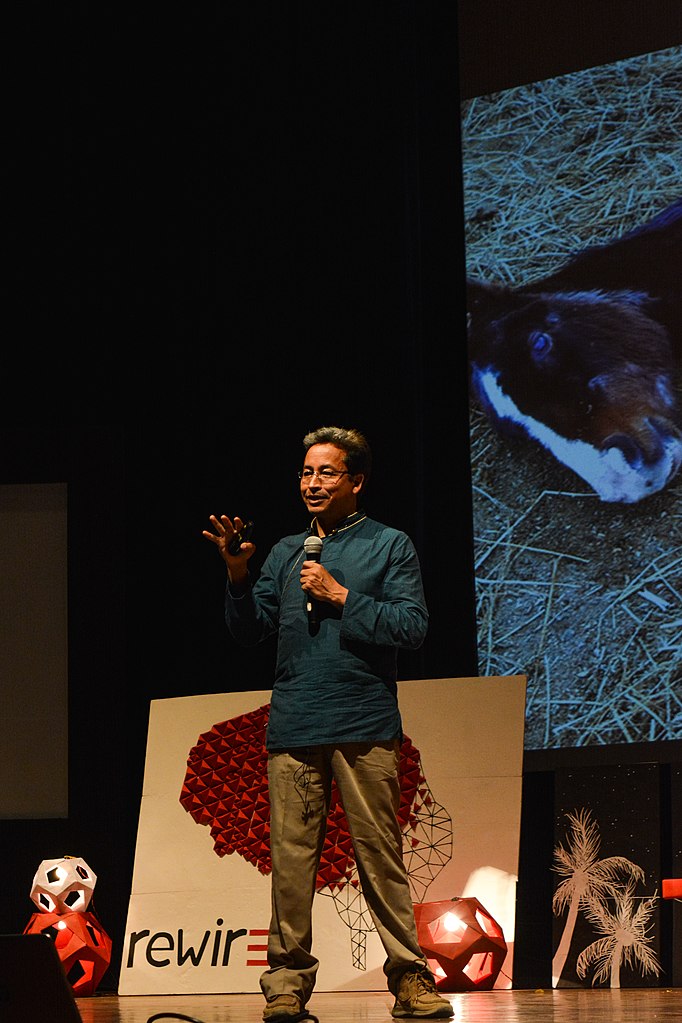
On March 6, environmentalist Sonam Wangchuk started a 21-day hunger strike at Martyrs Memorial Leh in support of constitutional safeguards for Ladakh under the Sixth Schedule after the latest round of talks between the central government and Ladakhi representatives failed in New Delhi. Several villages in Ladakh are protesting in support, and many individuals are volunteering to join him on the hunger strike in Ladakh’s capital, Leh.
Until 2019, Ladakh was a part of the state of Jammu & Kashmir. After the abrogation of Article 370 in August 2019, the two regions were split and demoted to union territories now ruled by the central government from New Delhi. Historically, geographically, and culturally, Ladakh has felt distinct from Jammu and Kashmir, so there has always been a demand for separation. The ruling BJP government fulfilled this demand and won Ladakh’s local hill council election in 2020 with a whopping majority on the promise of granting constitutional protections under the Sixth Schedule. However, four years later, their demands remain unfulfilled. The people of the region have come out in protest ahead of India’s 2024 general election to demand constitutional safeguards and their inclusion under the Sixth Schedule of the Indian Constitution.
Since December 2023, representatives from the Apex Body Leh (ABL) and Kargil Democratic Alliance (KDA) have had four rounds of talks with the High Power Committee (HPC) formed by the central government. After talks this winter did not yield any results, ABL and KDA called for the Leh Chalo protests, which brought everyday life to a standstill on February 3. After the latest round of talks ended without concrete outcomes on March 4, protests resumed in Ladakh. Wangchuk claimed that his fast-unto-death, supported by large segments of Ladakh’s population, would continue until the government supports his demands to enact the Sixth Schedule, grant Ladakh further sovereignty, and protect the ecologically fragile land from the ensuing climate crisis.
Wangchuk claimed that his fast-unto-death, supported by large segments of Ladakh’s population, would continue until the government supports his demands to enact the Sixth Schedule, grant Ladakh further sovereignty, and protect the ecologically fragile land from the ensuing climate crisis.
The Protestors’ Demands
Following the repeal of Article 370 in 2019, Ladakh was recognized as a separate Union Territory (UT) without legislature. While UTs like New Delhi and Pondicherry have their own Legislative Assemblies, Ladakh does not have one. In response, the people of Kargil and Leh have come together to demand inclusion in the Sixth Schedule of India’s Constitution, which allows for the administration of certain tribal areas as autonomous entities. The people’s demand has precedent; tribal areas exist under the same Schedule in Assam, Meghalaya, Tripura, and Mizoram.
The ongoing “People’s Movement for the 6th Schedule for Ladakh” has four core demands: inclusion in the Sixth Schedule, a return to statehood, a Public Service Commission, and two parliamentary seats, one for Kargil and another for Leh. Inclusion under this Schedule would allow Ladakh to create Autonomous District and Regional Councils (ADCs and ARCs, respectively), which protect tribal populations by framing ecologically and culturally attuned laws on land purchase, public health, and agriculture. With 97 percent of Ladakh’s population being tribal, residents say this would safeguard them from demographic changes and resource exploitation by outsiders.
The other key demand is the return of statehood. As a UT, Ladakh is directly controlled by the central government. Ladakh’s Autonomous Hill Development Councils, which were empowered before 2019 and monitored developmental projects by ensuring transparency and accountability in the district administration, have become almost dysfunctional since Ladakh became a UT. Today, Ladakh’s political representation lies restricted to a single parliament seat and two Autonomous Hill Development Councils in each district, which jostle with the Deputy Commissioner over the ambiguous distribution of power. Without a state legislature, the centrally-appointed Governor directs development, with no forum for the public to express their views.
The third demand is for a Public Service Commission to secure government jobs through reserved seats for the youth of Ladakh under the Scheduled Caste and Tribe status to ensure inclusion and representation in various sectors of government. The fourth demand is for two parliamentary seats, which the movement believes is necessary to represent the aims and aspirations of the two separate districts of Leh and Kargil.

Negotiations So Far
According to Ladakh representatives, the High Powered Committee has agreed to work on forming a Public Service Commission in Ladakh but has rejected the idea of statehood and the Sixth Schedule. In an interview with a Ladakh-based channel, Ladakhi BJP leader PT Kunzang urged Ladakhis to embrace the constitutional safeguards proposed by the Ministry of Home Affairs in the last negotiation. He emphasized that while the government will not implement the Sixth Schedule, it will consider similar provisions during negotiations. He also mentioned a proposal to reshape and give the existing Autonomous Hill Development Councils more power. However, the ABL and KDA have rejected this offer, fearing their demands will not be met during the upcoming General Election season.
While the central government has yet to meet protesters on their demands, the BJP has promised to add two more districts to Ladakh, Zanskar, and Nubra, as these regions have demanded district status since 2006. Due to its distance from the district headquarters, these regions are still deprived of basic amenities like health systems, connectivity, electricity, and education. This step by the government is likely a tactic to diffuse the current protests and win a majority of votes in Zanskar and Nubra in the 2024 General Election. However, creating two new districts might not save the BJP from losing elections in Ladakh, as the protestors are also hinting that they will boycott the upcoming elections.
Creating two new districts might not save the BJP from losing elections in Ladakh, as the protestors are also hinting that they will boycott the upcoming elections.
According to Apex Body Leh representatives, this protest might last longer than anticipated. Many like-minded groups across India are coming out in support of the protest in Ladakh. Furthermore, major political parties like the Aam Aadmi Party, the Indian National Congress, and other independent councilors are uniting in solidarity with the protestors.
In a region strife with political and religious divides, it is notable that the Kargil and Leh districts have joined forces in their demand for the Sixth Schedule. In this case, no middle ground will work. The government should revisit its decision and administer Ladakh into the Sixth Schedule to safeguard tribal culture and the ecologically sensitive region from unnecessary development. The local hill councils should be given more decision-making power so that locals can have a say in the region’s affairs. On the 14th day of his climate fast, Wangchuk threatened to march towards the India-China border on March 27 along with thousands of locals to make their concerns globally known. This may redefine the scale and gravity of the Ladakh protests from a geopolitical perspective and mark a new chapter for the People’s Movement for the 6th Schedule for Ladakh.
Also Read: Kashmir’s Youthful Aspirants: Politics Amidst Control and Change
***
Click here to read this article in Urdu.
Image 1: Prayer flags in Ladakh via Wikimedia Commons
Image 2: Sonam Wangchuk giving a TED talk via Flickr


